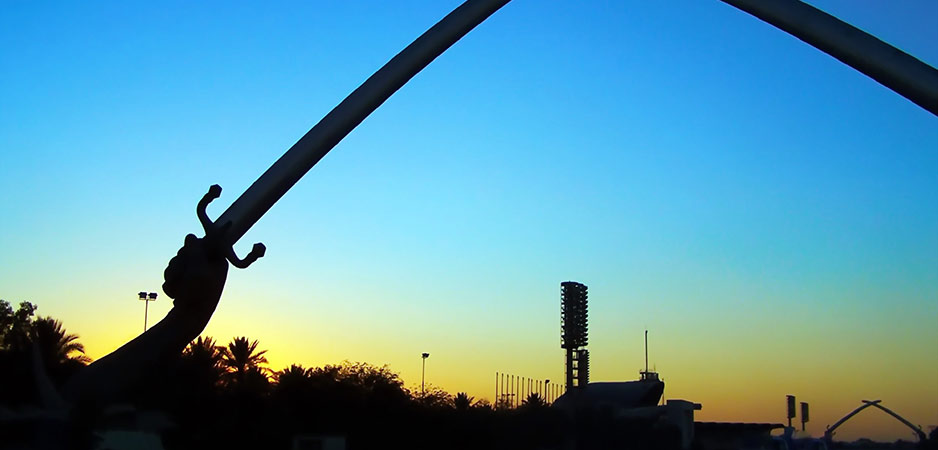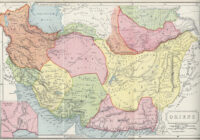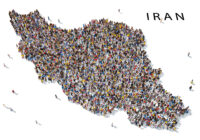Since October 2018, when the new Iraqi government took office, President Barham Saleh and Prime Minister Adel Abdul Mahdi highlighted that the war-torn country was never again to be involved in regional disputes and that it was time for a new political order. President Saleh defines Iraq’s future role as a mediator in the region in terms of foreign policy, building bridges of peace. Additionally, on September 17, Prime Minister Mahdi told the Secretary General of NATO Jens Stoltenberg that Baghdad seeks a “balanced foreign policy” to promote regional stability.
This new vision of Iraq’s foreign policy, which aims to prioritize the country’s interests, reminds of Turkey’s “zero problem with neighbors” approach, which has been implemented since the end of 2002 until the Syrian uprising in 2011. The domestic and regional political developments, however, lead many to ask whether Iraq’s new foreign policy venture is viable.
Over the past few months, Saleh and Mahdi have gone on numerous diplomatic visits across the region, as well as individual visits to Turkey, Iran and Saudi Arabia. In this context, an agreement was reached between Iraq and Jordan regarding the installation of an oil pipeline from Basra to Aqaba Port. Jordan, Iraq and Egypt signed agreements to improve cooperation in the fields of economy, trade and energy. In addition, Iraq and Saudi Arabia signed 13 agreements in areas such as security, trade, energy and political cooperation. The border crossing of Arar between the two countries is expected to officially reopen for the first time since it was closed following Iraq’s invasion of Kuwait in 1990.
Triggering Failure
In addition, Iraqi officials stated that they were ready to build a joint industrial zone with Iran, suggesting that multilateral diplomacy would be conducted regardless of the potential issues that might affect relations between both countries. It should be noted that Iraq has also provided positive support to the debate on the return of Syria to the Arab League. Syria was expelled from the organization because of its violent suppression of peaceful demonstrations in 2011, which eventually erupted in the ongoing civil war.
While Iraq is trying to develop its economic and diplomatic assets with neighboring countries, its new foreign policy vision, unlike Turkey’s, remains unclear in terms of an apparent framework. At the end of 2002, under the leadership of President Recep Tayyip Erdogan’s Justice and Development Party, Ankara sought to reduce conflict with neighboring countries while focusing on domestic issues, creating a safe haven for foreign investment and promoting its position on the international stage. Moreover, while Turkey attempted again to resolve the Cyprus issue, end hostility with Syria and normalize its relations with Armenia, it also tried to strengthen its existing ties with emerging key players such as Asia, Latin America and Africa.
However, this zero-problem approach, which conceives a multidimensional foreign policy and a soft power, proactive regional policy vision, has lost its relevance in 2011, as the Arab Spring morphed into war, and the Kurds achieved a territorial formation in Syria.
Iraq, which has been in a state of economic crisis ever since its 1980-1988 war against Iran, has not been able to regain stability following the 2003 US-led invasion. The post-invasion chaos has provided fertile ground for radicalization and terrorism, with the growing influence of armed groups like al-Qaeda and then the Islamic State (IS). Furthermore, Iraq itself has become a conflict zone between the US and Iran owing to the two adversaries’ power struggle for control in the region. Iran-backed Iraqi Shia political groups have obtained political power and marginalized Sunni factions from the political scene, which has given rise to grievances among sectarian groups and further fueled terrorist recruitment.
Iraqi Kurds, who have been fighting the central government since the First World War, have not felt as a genuine part of post-2003 Iraq, once again coming to the edge of war with Baghdad following Kurdistan Regional Government’s (KRG) 2017 independence referendum. Iraq, which is both directly and indirectly affected by instability in neighboring countries like Syria, does not seem to have the capacity to carry out its new foreign policy vision due to its ongoing ethnic, political, economic and terrorism-related problems. The ongoing mass protests, which have shaken the government to the core, show that Iraq’s domestic problems still overwhelm the functioning of the government.
Bad Neighbors
Iran’s political, economic and military influence limits Iraq’s internal and external mobility. Iraq’s border with Iran stretches for approximately 1,500 kilometers, and annual trade between the two countries is worth approximately $12 billion. Almost 40% of Iraq’s electricity needs are covered by Iranian gas. Last year’s protests against electricity cuts in southern Iraq left the Baghdad administration helpless, showing just one element of Tehran’s significant impact on the country.
During the struggle against the Islamic State, Iran provided equipment and training support to Iraq’s Hashd al-Shaabi, also known as the Popular Mobilization Forces (PMF), and succeeded in translating this support to the political stage during Iraq’s 2018 general election. The Fatah Alliance, led by Hadi al-Amiri — the head of the Badr Organization, which is part the PMF known for its proximity to Iran — became part of the government coalition. This type of influence prevents Baghdad from taking independent decisions.
On the other hand, the American invasion of Iraq has had an important impact on the decision-making process in Baghdad. Under an informal US-led agreement between political groups, the presidency is reserved for the Kurds, the premiership for Shia Arabs, and the post of speaker of parliament for Sunni Arabs. This has damaged Iraqi national identity and disrupted the bureaucracy.
While the US seeks to consolidate its influence over sectarian and ethnic groups in Iraq, Iran continues to increase its hegemony within the country through Shia political groups. It is, therefore, inevitable that Iraq is one of the countries most affected by the recent increase of tensions between the US and Iran, which has a potential turn into war. Following the introduction of sanctions on Iran, the US imposed sanctions on the Iranian-backed Iraqi Shia militias in order to weaken Tehran’s influence on the ground.
Israel, which adopts Washington’s anti-Iran policy, may also be pushing against the Iran-backed Shia militias in Iraq. It was alleged that the airstrikes on the PMF’s ammunition depot and bases near Baghdad were carried out by Israel between 19 July-25 August this year. Additionally, the bases of the Shia militias in Iraq have been subjected to numerous attacks since then. In fact, some claim that the airstrikes were launched from the Kurdish-controlled region in Syria with the financial support and assistance from Saudi Arabia.
In addition, while the US forced Iraq to abide by its sanctions imposed on Iran, Iran-backed Shia militia groups reinforce their power in the political sphere in Iraq. Moreover, Iran-backed political blocs in Iraq are forcing US troops out of the country, stressing that they will show defiance to US forces in case of an attack on Iran. The fact is that this situation threatens the fragile structure of the government in Baghdad. It also accentuates the possibility of Iran’s regional rivalry with Saudi Arabia, which would deepen the political deadlock Iraq finds itself in.
Shia Houthi militias in Yemen claimed responsibility for the attacks against the facilities of Saudi Arabia’s state-owned oil company, Saudi Aramco, on September 14, but allegedly the attacks were launched from the PMF bases in Iraq. Yet another claim was linked to PMF’s desire to avenge Riyadh for attacks on their bases in Iraq. In the meantime, being eager to mediate the tension between Tehran and Washington, Baghdad aims to get out of the crisis with minimum damage as a part of its new foreign policy strategy.
Problems and Vulnerabilities
While the presence of the Islamic State in Iraq is a serious trigger for internal instability, it also has a direct negative impact on Iraq’s relations with its neighboring countries. Although Baghdad has declared a victory against the terror group in 2017, according to the study conducted by the International Crisis Group, it still carries out low-intensity attacks. These attacks have increased recently, especially in disputed areas between the KRG and Iraq such as Kirkuk. In this respect, it does not seem possible to completely defeat IS as long as the grievances among Sunni groups persist.
Also, the location of the headquarters of the Kurdistan Workers’ Party (PKK), which is designated as a terrorist organization by the United States, the European Union and Turkey, in Iraq’s Qandil mountains, as well as the PKK’s terrorist activity in Turkey, have become a longstanding issue between Baghdad and Ankara. This issue has been further escalated due to Turkey’s cross-border operations and airstrikes against the PKK in Iraq, which does not designate the group as a terrorist organization. Furthermore, the strengthening of the PKK’s dominance in the Sinjar region deepens the lack of trust between the two countries. Although there has been a limited consensus between Iraq and Turkey in the fight against the PKK in the recent period, the failure to make it sustainable is damaging the relations between Baghdad and Ankara.
Almost one year after taking office, Prime Minister Mahdi still faces serious problems and vulnerabilities. Iraq’s health minister, Alaa al-Alwan, publicly announced his resignation on September 15, citing opponents within the ministry who sought to hinder its development through “blackmail and misinformation.” Although the Islah wel Bina coalition, led by Muqtada al-Sadr and former Prime Minister Haidar al-Abadi, and the Bina coalition, led by Hadi al-Amiri and former Prime Minister Nouri al-Maliki, have co-founded the present government, the continuation of disagreements between parties on many issues, like Iranian influence in the country and the political and military role of the Iranian-backed PMF in Iraq’s future, prevents Baghdad from focusing fully on its pending problems.
One should underline that at the beginning of September, Sadr — the Shia cleric and former leader of the powerful militia that fought against al-Qaeda during the Iraq War — announced that he would withdraw his support from the current government unless reforms take place. On October 27, Sadr stated that his bloc, Sairoon, would go into opposition until the demands of the anti-government protesters were met. The representative of the Iraqi Supreme Authority Grand Ayatollah Ali al-Sistani in Lebanon, Hamid al-Haffaf, declared that Mahdi was not the body’s preferred candidate for the post of prime minister, but there was no objection to it. These developments only exacerbate the fragility of the coalition government.
In addition to the disagreements between political groups, the continued impact of the destruction caused by the Islamic State is one of the important issues faced by the government. Although it has been two years since the announced defeat of IS, there are still approximately 1.8 million internally displaced persons in Iraq. Almost 8 million people are in need of humanitarian assistance, and the delay in the reconstruction of 150,000 houses and infrastructure destroyed across seven provinces deepens the problems. Undoubtedly, the government’s foreign policy moves will be affected by the humanitarian crisis because its whole focus and efforts have to be directed toward solving these domestic issues.
Given the current geopolitical problems Iraq faces, the best way to strengthen its foreign policy would be by getting a non-divisive and an inclusive policy to minimize the divisions between the opposition groups within the country and uniting them under a joint foreign policy strategy. However, Iraq’s balanced foreign policy approach is being constrained by escalating domestic issues unfolding against the backdrop of the power struggle between the US and Iran. The ongoing mass protests, which have claimed an estimated 240 lives to date, indicate that Baghdad has to first address its internal problems before embarking on a new foreign policy venture.
The views expressed in this article are the author’s own and do not necessarily reflect Fair Observer’s editorial policy.
Support Fair Observer
We rely on your support for our independence, diversity and quality.
For more than 10 years, Fair Observer has been free, fair and independent. No billionaire owns us, no advertisers control us. We are a reader-supported nonprofit. Unlike many other publications, we keep our content free for readers regardless of where they live or whether they can afford to pay. We have no paywalls and no ads.
In the post-truth era of fake news, echo chambers and filter bubbles, we publish a plurality of perspectives from around the world. Anyone can publish with us, but everyone goes through a rigorous editorial process. So, you get fact-checked, well-reasoned content instead of noise.
We publish 2,500+ voices from 90+ countries. We also conduct education and training programs
on subjects ranging from digital media and journalism to writing and critical thinking. This
doesn’t come cheap. Servers, editors, trainers and web developers cost
money.
Please consider supporting us on a regular basis as a recurring donor or a
sustaining member.
Will you support FO’s journalism?
We rely on your support for our independence, diversity and quality.






